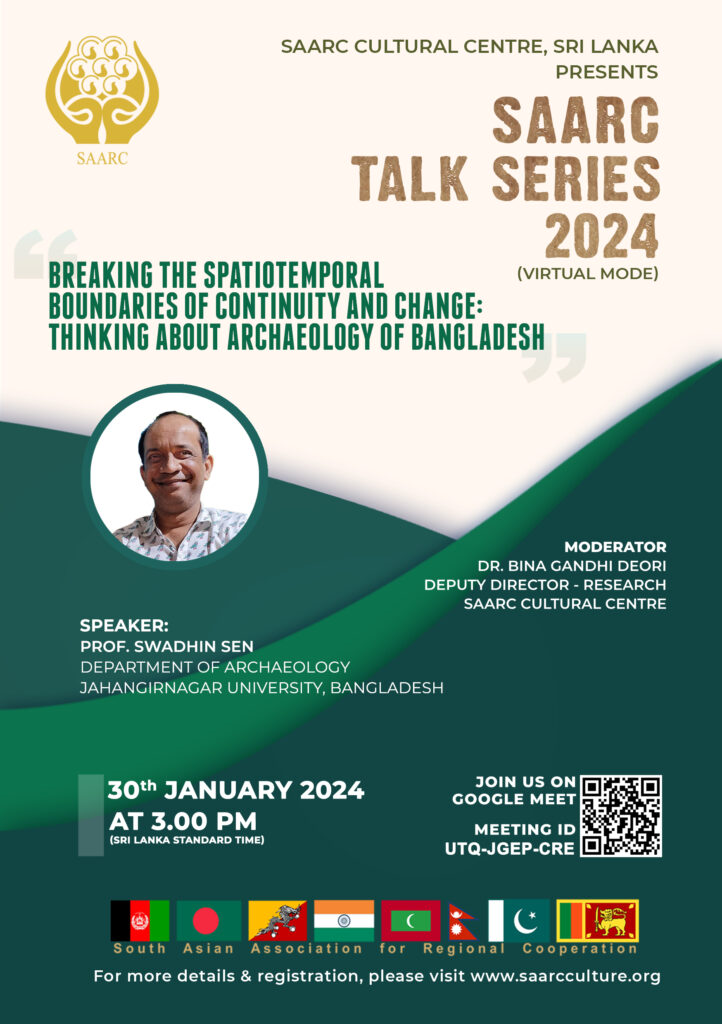Best wishes to the Kandy Esala Perahera Festival of 2024, the esteemed cultural festival of this country, commencing 10th of August. This grand event, embodying centuries of pride, showcases the rich cultural identity of Sri Lanka to the world. Let us pass on this heritage to our children and educate them about its significance.
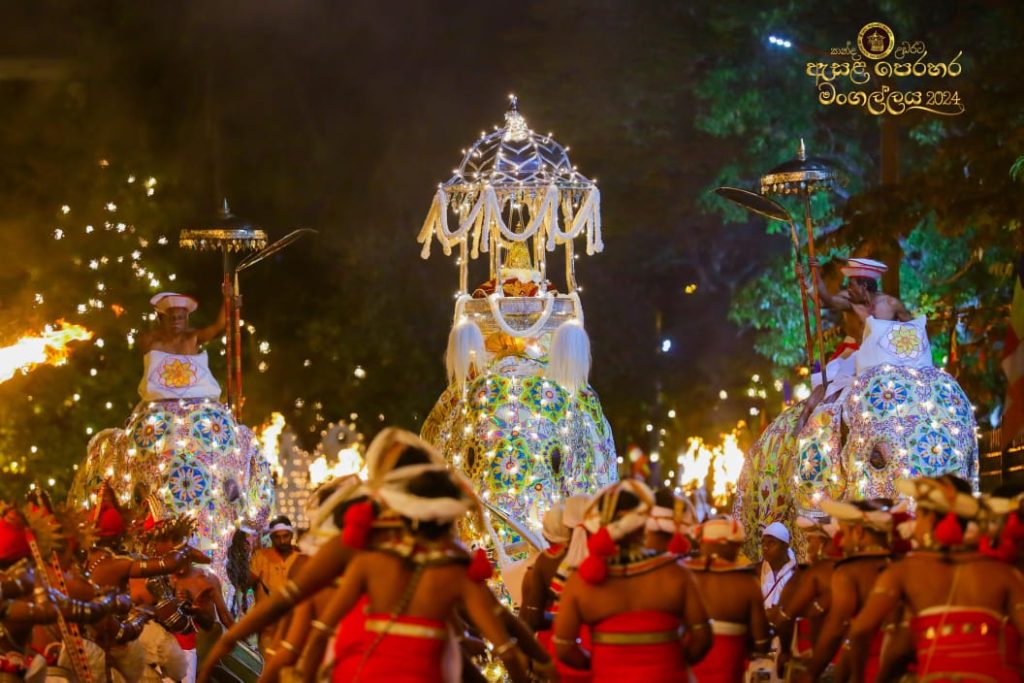
The basic needs of humans are identified as Food, Water, Shelter and Clothing. Since the beginning of civilization, clothing has protected humans from the weather and enabled travel among diverse climates. The prehistoric communities learned to create clothes to suit the changing weather which was the origin of textiles and attire. This developed into clothing styles based on available raw material, technology and requirements of the people and culture. Clothing is also one of the beautiful indicators of specific cultures as traditional clothing indicates the Region and the country of origin.
The word “textile” derives from the Latin word “texere” which means “to weave” and today it refers to cloth woven on a loom by using thread or fibres. Thread for textile is produced by spinning fibres such as wool, flax (linen), cotton, silk, hemp, jute, cashmere, mohair, alpaca, angora, ramie, etc., natural fibres or polyester, rayon, nylon, acrylic, spandex, viscose, carbon, etc., artificial fibres. The fibres woven together through different techniques such as weaving (loom and machines), knitting, knotting, crocheting, pressing to create textiles. The earliest textiles were created by using animal or plant fibre during the Prehistoric period.
This programme will provide an opportunity for textile artists and designers to combine traditional and modern as well as textiles and materials from the Region and develop new ideas and styles. This is also an opportunity to work with designers of the Region, exchange ideas and techniques and establish Regional trends.
The main objectives of the Visions of Traditional and Contemporary Textiles Workshop and Exhibition are as follows:
2.1 To revitalize the disappearing crafts associated with tangible and intangible cultural heritage of textiles of the SAARC Region.
2.2 To introduce Regional fashion based on the traditional textiles and designs.
2.3 To create an opportunity for the textile and fashion designers of the Region to mutually exchange ideas and develop Regional contacts.
2.4 To bring traditional and modern designs together in the same platform.
2.5 To showcase a fashion show with traditional and modern costumes of the Region and portray possibilities and future trends.
The SAARC Cultural Centre anticipates the following outcomes from this event.
3.1 Mutual respect and understanding of traditional textiles and opportunities to collaborate in future.
3.2 Establishment of Regional Trends and new Designs which include traditional and modern attire.
3.3 Exchange of traditional and modern techniques of costume design.
3.4 Establish a Design Forum for the SAARC Region.
This Programme will be held for 4 days in the Republic of Maldives. The Programme will provide opportunities to create traditional and modern costumes using the textiles of the esteemed Member States. An exhibition of textiles and costumes, both traditional and modern will also be held simultaneously. This programme will culminate in a Fashion Show.
The Workshop will have two sessions each day for 3 days with Resource persons sharing their expertise with the esteemed Member States. The Workshop will also provide opportunities for interactions among designers, to learn from each other, exchange ideas and future collaborations. Space will be made available for the participants to create new costumes combining their knowledge with each other. It is hoped that participants will create a few new items for the exhibition and the fashion show based on their experience at the workshop. The grand finale of the workshop will be the creation of modern or traditional costume of an esteemed Member State or States using traditional textiles of the participating Member States. This will be also available for virtually in real time for the esteemed Member States.
Sarees are the traditional and popular dress in most of South Asia especially in Bangladesh, India, Nepal, Pakistan and Sri Lanka. There are different textiles and designs used in Saree manufacture of the esteemed Member States and the drapery styles are also different. These sarees and drapery styles are undergoing changes with new drapery styles being created to suit the information age we now live in. This will also include opportunities to experience the different traditional dresses of the Region including Gho and Kira, Shalwar Kameez, Doti, Kurta, Saruwal, Lungi, Sarong, Dhivehi Libaas, Dhigu Hedhun, Sarungan, Daura Saruwal, Achkan, Sherwani, etc. The live demonstration segment of the Workshop will provide an opportunity to invent new drapery styles as a group from all esteemed Member States, for the public and participants to try different traditional costumes from the esteemed Member States, etc. This would also provide an opportunity for the participants to demonstrate their skills in various aspects of creating costumes, traditional costume decorations made by hand paintings, embroidery, etc.
There will be stalls allocated to each participant Member State to display their traditional and modern attire, different types of textiles from the Member State, accessories, and other items. The participants are recommended to bring the unique textiles of the esteemed Member State to be displayed and to be shared with other participants to create new and exciting costumes which will be displayed during the exhibition. The participants are encouraged to bring their own creations including accessories to be displayed. Photographs, drawings and digital displays of participant’s iconic creations can also be displayed at the exhibition.
The Fashion Show will be held on the final day and traditional and modern costumes from the esteemed Member States will be on the catwalk. This will also include the costumes created by the participants during the workshop. The costumes (including textiles and sarees) will be modelled by the participants and others. The designs of the Fashion show will be under the themes “Casual attire, Office attire and Party/Wedding attire” for the public who consist of all sizes and shapes. All participants are expected to model their creations during the Fashion Show. The SAARC Cultural Centre will also recruit volunteers who will support the Fashion Show as models as necessary.
The esteemed Member States to select participants who can contribute to the multiple segments of the Programme mentioned above. At least one participant should be able to share their knowledge / skills on each segment.
5.1.1 Host Member State of the Republic of Maldives is invited to nominate a maximum of twenty (20) participants. Other esteemed Member States are invited to nominate a maximum of eight (08) participants for the Visions of Traditional and Contemporary Textiles Workshop and Exhibition.
5.1.2 The esteemed Member States are respectfully requested to take into consideration the following guidelines.
5.1.2.1 The participants should be textile designers, dress designers, traditional creators of textile, traditional costumes creators, fabric painters, embroiderers, designers who combine traditional with modern costumes, etc.
5.1.2.2 Among the participants at least one (01) person should be a Resource Person knowledgeable about the textile and traditional costumes of the Member State including the history, designs, tangible and intangible heritage associated with textile and attire. The Resource Person from the esteemed Member States will discuss and present the intricacies and details of textiles and costumes during the workshop.
5.1.2.3 A gender balance among the participants should be maintained if possible.
5.1.2.4 The nominated participants should be experts and understand textiles and costumes of the esteemed Member State.
5.1.2.5 Participants from different areas/regions of the Member States would be highly appreciated.
5.1.3 The Airfare to the Host Member State of the Republic of Maldives for the Officially Nominated Participants will be borne by the esteemed Member State.
5.2.1 Category A – The SAARC Cultural Centre would also accept the participation of other Experts from the esteemed Member States (other than the Official Nominees of the esteemed SAARC Member States).
5.2.2 The selection of other participants (Category A) will be at the discretion of the SAARC Cultural Centre based on the availability of space, their experience and expertise in textile and costume designs, etc.
5.2.3 SAARC Cultural Centre would provide local transport, accommodation and access to all the activities at the event.
5.2.4 Airfare to the Host Member State of the Republic of Maldives will be borne by the participant.
5.2.5 Category B – Participants from the Host Country where the event is held can participate. (Participants with experience in textile, design, accessories, etc., both traditional and modern from the esteemed Member State of the Republic of Maldives.)
5.2.6 Other Participants (Category B) from the Host Member State will not be provided with local transport and accommodation.
5.2.7 Other Participants (Category B) will be provided access to all the activities of the event.
5.3 Virtual Participants – All Member States to nominate any number of participants to join the Workshop/Webinar virtually. The Virtual activities will be open to the Public with prior registration.
6.1 The names of all participants (Official & Other Participants Category A & B), relevant biographical information including their experience in textile and costume design industry, contact details and copy of passport should be sent through the Ministry of Foreign Affairs / External Affairs of the esteemed Member State via the SAARC Secretariat to the SAARC Cultural Centre.
6.2 The esteemed Member States are required to send their official nominations for the Visions of Traditional and Contemporary Textiles Workshop and Exhibition on or before 31st August 2024.
6.3 All Participants (Official Nominees and Other Participants) must fill the Registration Form which is attached as Annexure 1.
7.1 All local hospitality including accommodation, meals and local transportation will be provided for the Officially Nominated Participants and Other Participants of Category A for the official duration of the Programme by the SAARC Cultural Centre.
7.2 SAARC Cultural Centre will provide sewing machines and other required items to be used during the workshop depending on the availability.
7.3 The participants to send a list of requirements to the SAARC Cultural Centre to be obtained from the Host Member State which will be provided by the SAARC Cultural Centre contingent to the availability. Please include photographs of your requirements to expedite the process of obtaining equipment, etc. (Requirements which the participants will be unable to bring due to weight limitations, however, traditional or local equipment required might not be available in the Host Member State.)
7.4 Participants are encouraged to bring and show case their creations at the exhibition and the workshop which will include accessories.
The Host Member State to propose suitable dates for the Visions of Traditional and Contemporary Textiles Workshop and Exhibition in September 2024.
The Host Member State to select a suitable location for the Visions of Traditional and Contemporary Textiles Workshop and Exhibition and share the details with the SAARC Cultural Centre at the earliest.
The SAARC Cultural Centre (SCC), Colombo aims to promote, peace and unity in the SAARC Region through its various cultural activities and publications based on original research on different aspects of cultures of the SAARC Region.
SAARC Culture Journal is an annual research journal of the SAARC Cultural Centre Colombo, which seeks to provide a platform to the academics, practitioners and policy makers of culture in the region to present their research findings and to debate on issues of mutual and common interest. The journal is widely disseminated as an on-line publication to project cultural richness and cultural diversity of the SAARC Region.
Cultural map of South Asia is replete with many forms of tangible and intangible heritage carrying deep socio-cultural significance. This vast repertoire of knowledge is manifested in many forms of cultural expressions. One such form is crafts that are still being consumed by millions of its people, unbeknownst to the knowledge of the majority, that they play an invisible, yet a major role in this process as artisans, traders and consumers.
As such, crafts and craftsmanship has been the bedrock of our civilisation and crafts are not only a testament to creative expression inherent to humans, but also intertwined with values, cultural identities and diverse histories and stories of the various communities of the region.
Creativity, in all likelihood, has been a part and parcel of everyday life in South Asia, which involves many rituals, and celebrations from birth to death presenting a remarkable consonance between humans and nature. The craft map of South Asia, at a glance, is heterogeneous and geographically dispersed with certain craft traditions fast disappearing. While certain crafts face many threats to its sustenance, when it comes to other crafts, the dominant narrative of decline in the craft seems invalid due to successful interventions by various stakeholders involved.
Crafts and craftsmanship in modern times, therefore, sit at the center of a web of many challenges and prospects. Crafts and crafts related industries could constitute one of the most dynamic sectors of the economy if due attention is extended to artistic creations embedded in crafts are protected and promoted not only for attracting capital, but also to sustain, safeguard, and revitalise the rich cultural heritage of South Asia.
In this spirit, the SAARC Culture journal calls for submissions that focuses on various aspects and dimensions of crafts and craftsmen of the South Asian Region under the theme “Celebrating Craftsmanship: Exploring Cultural Heritage in the SAARC Region” focusing on major categories of crafts;
The submissions will look at the crafts of South Asia from a number of perspectives, including but not limited to:
• Growth and prospects of traditional crafts
• To explore the adaptability and viability of crafts and crafts related industries amidst a wide range of socio-economic conditions
• To provide an objective assessment and an analysis of the crafts as an industry
• To analyse diversity of conditions that characterise crafts and craftsmen
• To create informed debate on the crafts and craftsmanship in South Asia
Deadline for Full Paper submissions: 27th September 2024
Submission Guidelines:
PART 1 -ARTICLE GUIDELINES
• All the articles in English as per the SAARC Mandate.
• An abstract of 250-300 words and the full paper including a minimum of 5 keywords.
• Word count 8,000-10,000 words (excluding the abstract and the bibliography)
• Font type -Times New Roman, 12 points
• Line spacing – 1.5
• Page margins – Left: 1.5”
Right/ Top/ Bottom- 1”
• Article Title – Font Size 14 points and Bold
• Article Subtitles: Font size 12 points and Bold
• Organize the Tables, figures, and images in the body of the article.
• Reference Style: MLA (9th Edition)
• Use English: British English spellings
• Enclose references at the end of the article.
• Illustrations – Tables, Figures and Plates:
• Diacritical marks on any word of other languages should be avoided. Such words or phrases must be italicized which are not included in the English Oxford dictionary. As far as possible, footnotes and endnotes are to be avoided. A glossary of words may be provided for all non-English terms used in the text.
• Acknowledgement and Funding statement, if any, is to be placed at the end of the paper just before the references.
• The final decision regarding the publication will be taken by the Editorial Board.
• All submissions will be screened for plagiarism.
PART II-AUTHOR PROFILE GUIDELINES
• Author/s Profile: A short biographical entry of the author in 100 words that include the name with designation, affiliation along with a colour photograph of the author(s) (300 DPI maximum) should be sent along with the abstract.
• It is the responsibility of the author to obtain clearance from the copyright holder for any previously published material, including figures, tables or photographs in the manuscripts.
• Manuscript would be accepted for publication on the understanding that the submitted work is original, unpublished and new contributions, definitions and interpretations.
For this purpose, please submit your declaration (in the format given below) in respect
of your contribution.
“I……………………declare that the article titled ……………has not been previously published or been submitted/ accepted for any other publication”.
………………………………….
Signature
…………………………………
Date
The following criteria provide guidance for the research papers
| Component | Description |
| Title | Title No more than 25 words; Clearly articulates the proposed paper. |
| Background/introduction/research problem (issue) | Provides background information or context to the study highlighting the importance of the topic while noting the gaps that need to be addressed; how it relates to current knowledge, practice or literature; and concludes with a statement of purpose (main aim) or the question to be addressed in the paper. Avoid using in-text citations in the Abstract. |
| Methodology | Provides a summary of how the activity was undertaken, the persons involved, the resources or equipment, the materials used for the interpretation/analysis etc. required, and how the processes or outcomes were documented and evaluated. Quantitative, qualitative or mixed methods are equally acceptable, so long as they are appropriate to the research question or issue. |
| Discussion (Results) | Provides a brief summary of findings or conclusions to be presented in the paper. In other words, what concepts emerged/what was found/what happened. |
| Findings & Conclusion/ Implications | Provides a statement or conclusion concerning the significance of the findings and the future perspective of your research with emphasis on the research’s potential application or impact. |
| Overall quality of the paper | The paper should be well-organised and presented according to the submission guidelines. Originality and relevance of the study is given priority during the selection process. |
LAST DATE FOR THE SUBMISSION OF FULL PAPER: 27th September 2024
Manuscripts and all correspondence should be addressed to:
Deputy Director-Research
SAARC Cultural Centre
224, Bauddhaloka Mawatha, Colombo 07
Sri Lanka
Email: sccpublications@gmail.com
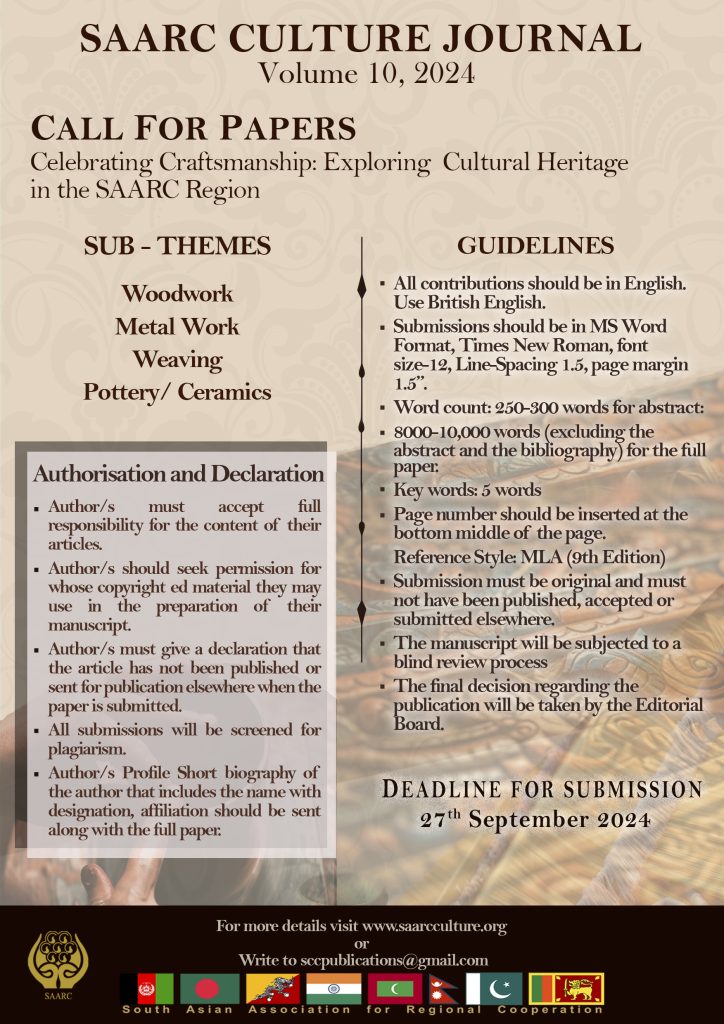
SAARC Regional Seminar on Intangible Cultural Heritage for Food Storage in the SAARC Region was approved by the Fourteenth Meeting of the Governing Board of the SAARC Cultural Centre held from 22nd to 23rd October 2024, and at the Sixtieth Session of the Programming Committee Meeting held in Kathmandu from 28th to 30th April 2025.
Food storage refers to the process of keeping food items safe and fresh for consumption over an extended period. It involves storing food in a suitable environment to prevent spoilage and contamination and maintain its nutritional value. The methods of food storage/preservation include refrigeration, the use of storage containers etc.
Food preservation, on the other hand, is the process of treating food in a way that prevents or delays spoilage caused by micro-organisms or other factors. Food preservation methods include drying, salting, pickling, fermenting, smoking or using chemical preservatives to extend the shelf life of food.
Food storage/preservation has been integral to South Asian culture for centuries. Traditional food storage/preservation practices encompass a wide range of techniques that preserve food for longer periods and enhance its nutritional value and flavour. Intangible Cultural Heritage (ICH) for food storage/preservation in the SAARC Region is imbued with tradition and culture. Traditional food storage/preservation knowledge generated a culture that has become part of human history. The SAARC Region has a rich food storage/preservation heritage that has stood the test of time. However, with the advent of modern food storage/preservation systems, these traditional practices are slowly dying away, putting our intangible cultural heritage at risk.
Thus, this seminar aims to promote the appreciation of traditional food storage/preservation practices, a reminder to embrace our traditional practices and preserve our cultural identity. Through discussions and analysis of case studies, the seminar will explore effective methods for transmitting and preserving traditional food storage/preservation practices.
The seminar is designed for two days, inviting papers from experts, academics, scholars and practitioners of traditional food storage/preservation methods from the Member States.
The Seminar aims to address the following research questions:
2.1. What is the impact of the evolution of food storage/preservation practices on the food culture of the SAARC Region?
2.2. What is the role of oral traditions in passing down the intangible heritage of food storage/ preservation?
2.3. In what ways were food storage/preservation practices traditionally divided among genders?
2.4. How can communities safeguard the intangible cultural heritage related to food storage/preservation?
2.5. What are the changes made by modern food storage/preservation methods towards diet and nutritional values when compared to the traditional methods of food storage/ preservation practices?
The main objectives of the Seminar are as follows:
3.1. To investigate how oral traditions contribute to the cultural significance of food storage/preservation practices;
3.2. To examine how gender roles evolved and what their impact is on the current traditional food storage/preservation practices;
3.3. To identify the challenges and threats communities face in preserving these practices and how can they overcome them;
3.4. To explore in what ways, have modern preservation methods affected the traditional techniques of food storage/preservation in terms of diet and nutritional value of the foods;
3.5. To provide a platform for networking and knowledge exchange, facilitating the spread of these practices and encouraging their incorporation into modern lifestyles.
The Seminar will be a blend of theoretical discussions and practical case studies, making it an enriching and interactive experience for the participants.
4.1. Speakers will do oral presentations to share their expertise and insights on the subject.
4.2. Assign session chairs to introduce speakers, manage Q & A sessions and ensure the smooth flow of the Seminar.
4.3. Virtual options will be available for those participants unable to attend physically.
The expected outcomes of the Seminar are the following:
5.1. An increased understanding of the significance of traditional food storage/preservation as part of intangible cultural heritage.
5.2. Development of potential partnerships to support traditional food storage/preservation practices in the SAARC Region.
5.3. Generation of new initiatives aimed at safeguarding and promoting traditional food storage/preservation techniques.
5.4. Dissemination of best practices, case studies and research findings within the SAARC Region through the publication of papers presented at the Seminar and uploading them online on the SAARC Cultural Centre website for free global access.
The following sub-themes have been identified for the seminar. However, papers based on related themes will be accepted depending on their content and relevance to the main themes.
6.1. Traditional Techniques and Knowledge of Food Storage/Preservation
The traditional techniques of food storage/preservation have been developed over centuries to preserve food for a longer period. These techniques vary from region to region like smoking, drying, pickling, fermenting etc. This session seeks contributions that explore the different methods of food storage/preservation practised in the SAARC Region.
6.2. Intersections of Food Storage/Preservation Practices with Cultural Identity and Heritage
Food storage/preservation practices are deeply intertwined with cultural identity and heritage preservation. This session encourages papers that reflect the values, beliefs and traditions of a community, making them an integral part of cultural heritage.
6.3. Oral Traditions Related to Food Storage/Preservation Methods
Oral traditions related to food storage/preservation methods are an integral part of cultural heritage. This session welcomes papers exploring the oral traditions that give insight into the cultural significance of food storage/preservation practices and their role in the community.
6.4. Sustainability and Resilience of Traditional Food Storage/Preservation Practices in the Modern World
Traditional food storage/preservation practices have stood the test of time and have proven to be sustainable and resilient in the modern world. This session seeks contributions that highlight these aspects of traditional food storage/preservation practices.
6.5. Gender Roles and Traditional Food Storage/Preservation
Gender roles have a significant impact on traditional food storage/preservation practices. In many cultures, women are responsible for processing and storing food. In this session, we seek contributions that address the division of labour that has resulted in different techniques and methods of food storage/preservation.
6.6. Revival and Preservation of Endangered Food Storage/Preservation Practices
There is a recent trend of revival of these practices due to their cultural significance and sustainability. Efforts are being made to preserve and promote endangered food storage/preservation practices to keep their cultural heritage alive. In this session, we welcome papers that examine the role played by various organizations and communities to preserve and promote endangered food storage/preservation practices.
6.7. Community-based Approaches to Safeguarding Intangible Cultural Heritage Related to Food Storage/Preservation
The community-based approach to safeguarding intangible cultural heritage related to food storage/preservation is crucial for preserving these practices. Organisations and communities are coming together to document and promote traditional food storage/preservation practices. This session welcomes papers that explore active community participation in knowledge sharing.
Officially Nominated Participants from the Member States
7.1. The SAARC Cultural Centre invites all Member States to send a maximum of Five (5) Official Nominations of experts working on the abovementioned theme from their respective countries for the SAARC Symposium. The Host Member State can nominate a maximum of 15 Official Nominees.
7.2. All Official Nominees must present a paper at the symposium.
Other Participants from the Member States
7.3. The SAARC Cultural Centre would also accept the participation of other experts from the Member States (other than the Official Nominees of the respective SAARC Member States) as well as those residing outside the SAARC Region provided they can meet their travel and accommodation expenses to attend the symposium.
7.4. The SCC, however, reserves the right to accept or reject any request for participation based on the availability of space and the relevance of the abstract to the symposium themes.
25th-27th November 2025
Dr. Bina Gandhi Deori, Deputy Director (Research)
Email: dd-research@saarcculture.org/sccpublications@gmail.com
Download Documents :Full Details, Annexure 1 & Annexure 2
SAARC Cultural Centre, Colombo is presenting its upcoming Fourth Session of the SAARC Talk Series 2024 on 30th April 2024 (Tuesday) at 2:00 pm (Sri Lanka Standard Time). The lecture will be delivered by Dr. Aly Shameem, Assistant Professor, Faculty of Arts, Maldives National University.
Dr. Aly Shameem will deliver his lecture on the topic “Maldives Cultural Music and Dances: Local and Regional Blend of Rich Performing Arts Traditions”.
The presentation is open to public. To attend kindly register at the link given below.
Please click here to register
Meeting link: https://meet.google.com/eto-fgdk-yze
Do spread the word. We look forward to your participation and engaging discussions during this enlightening lecture.
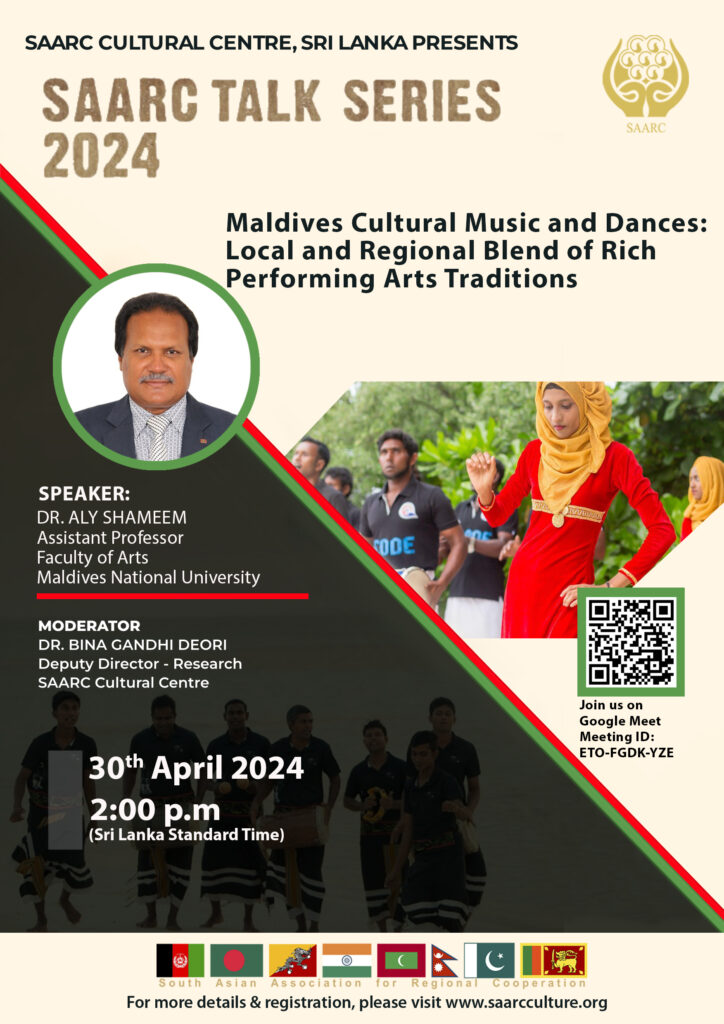
The SAARC Cultural Centre will be screening the award-winning movie “PINK” at the Moon Bastion of the World Heritage City of Galle on 5th April 2024 at 8:30 pm. PINK is a movie portraying three young female professionals facing social and cultural prejudices, political pressure and respect for their choices. It is a movie with strong social meaning which encourages women to speak up in society and fight for their choices.
Pink is directed by Aniruddha Roy Chowdhury and was first screened in 2016. The Cast includes Amitabh Bachchan, Taapsee Pannu, Kirti Kulhari, Andrea Tariang, Vijay Varma, etc.
Please join us at the Moon Bastion Open Air to enjoy this uplifting movie.
Date: 5th April 2024 Time: 8:30 pm onwards Location: Moon Bastion of the World Heritage City of Galle
Entrance Free
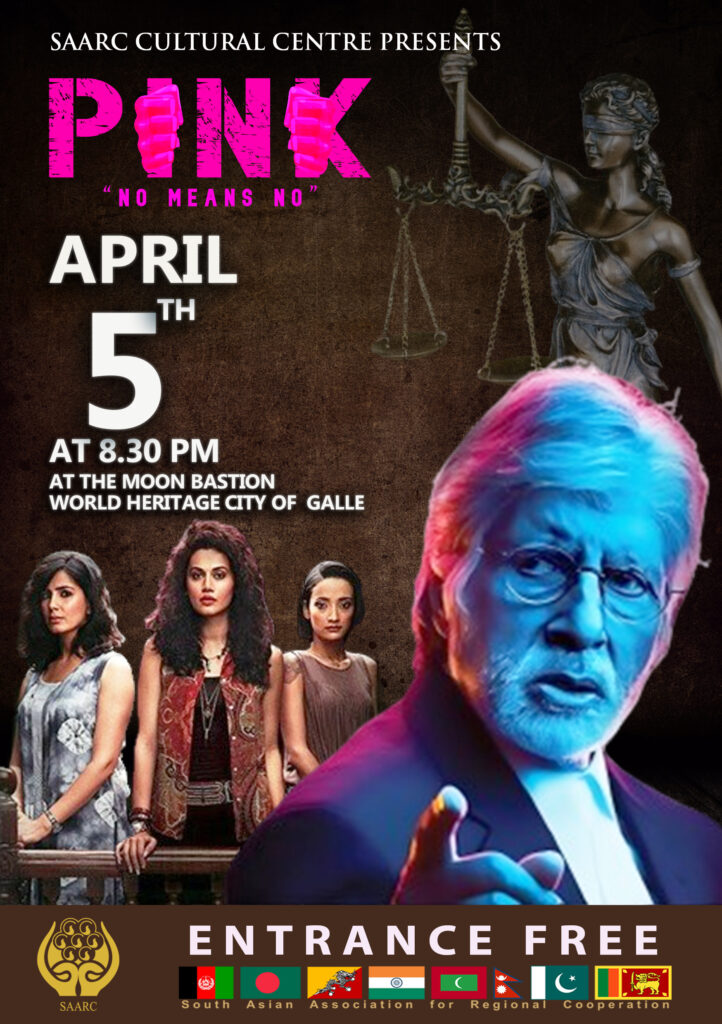
Introduction
The SAARC Puppetry Day was introduced this year to highlight fast disappearing traditional entertainment of puppetry. The pandemic had rather adverse effect on this traditional entertainment due to travel restrictions and many of the traditional puppetry craftspeople had to leave their trade and look for new avenues of economic support thereby having a detrimental effect on the already disappearing craft. The puppetry tradition in Sri Lanka uses handmade puppets using traditional techniques and methods passed down from generation to generation. This is an attempt by the SAARC Cultural Centre to ensure the intangible heritage of the puppetry traditions of Sri Lanka, both the art of making them and the tradition of using folk stories, Buddhist stories and others to entertain their audiences are brought alive and enjoyed by the SAARC Region.
Puppetry Day Programme
The Puppetry Day will consist of 2 shows:
The Puppeteers use puppets to share folk tales and traditional historical stories of Sri Lanka, etc., passing on the intangible cultural heritage of puppet making, folk lore, historical stories, etc., to the next generation. Some of the stories and events used for the Puppet show are as follows:
This is a FREE Public Event and all are welcome.
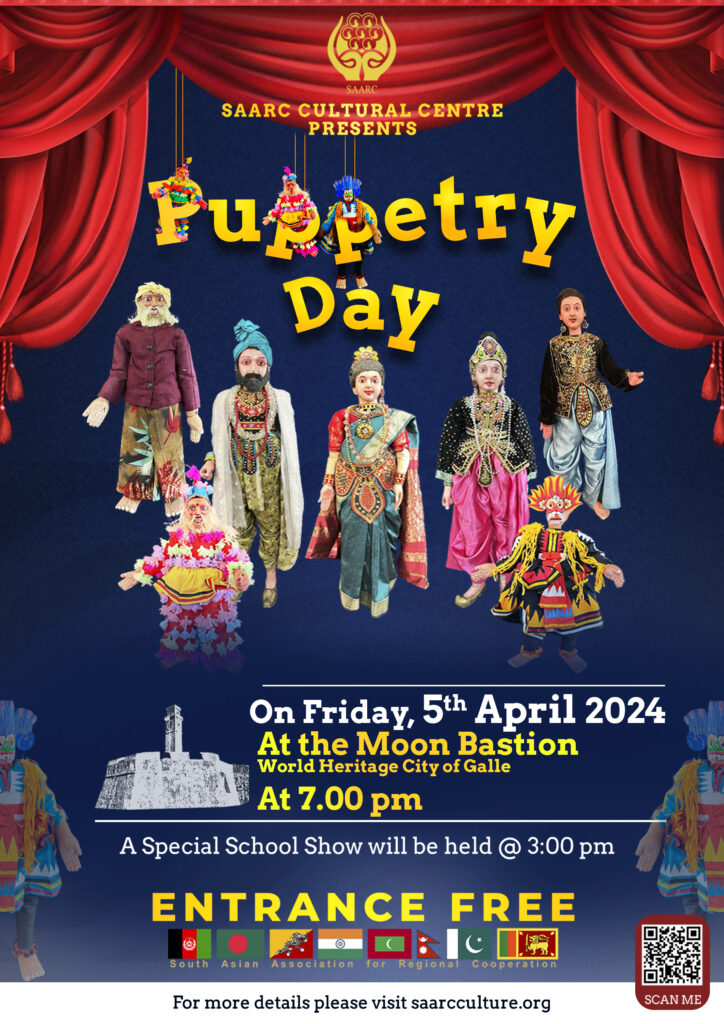
SAARC Cultural Centre Presents World Puppetry Day Celebrations On Friday 5th April 2024 At Moon Bastion, World Heritage City of Galle at 7:00 pm . A Special School Show will be held @ 3:00 pm at the Moon Bastion, World Heritage City of Galle.
SAARC Cultural Centre, Colombo is presenting its upcoming Second Session of the SAARC Talk Series 2024 on 20th February 2024 (Tuesday) at 3:00 pm (Sri Lanka Standard Time). The lecture will be delivered by Dr. Shrikant Ganvir, Assistant Professor, Dept of A.I.H.C. and Archaeology, Deccan College PGRI, Deemed to be University, Pune, India.
Dr. Shrikant Ganvir will deliver his lecture on the topic “Sacred Landscape of the Buddhist Monastic Sites of North-eastern Andhra Pradesh, India”.
The presentation is open to public. To attend kindly register at the link given below.
Please click here to register
Meeting link: https://meet.google.com/dnq-eyuq-asi
Do spread the word. We look forward to your participation and engaging discussions during this enlightening lecture.
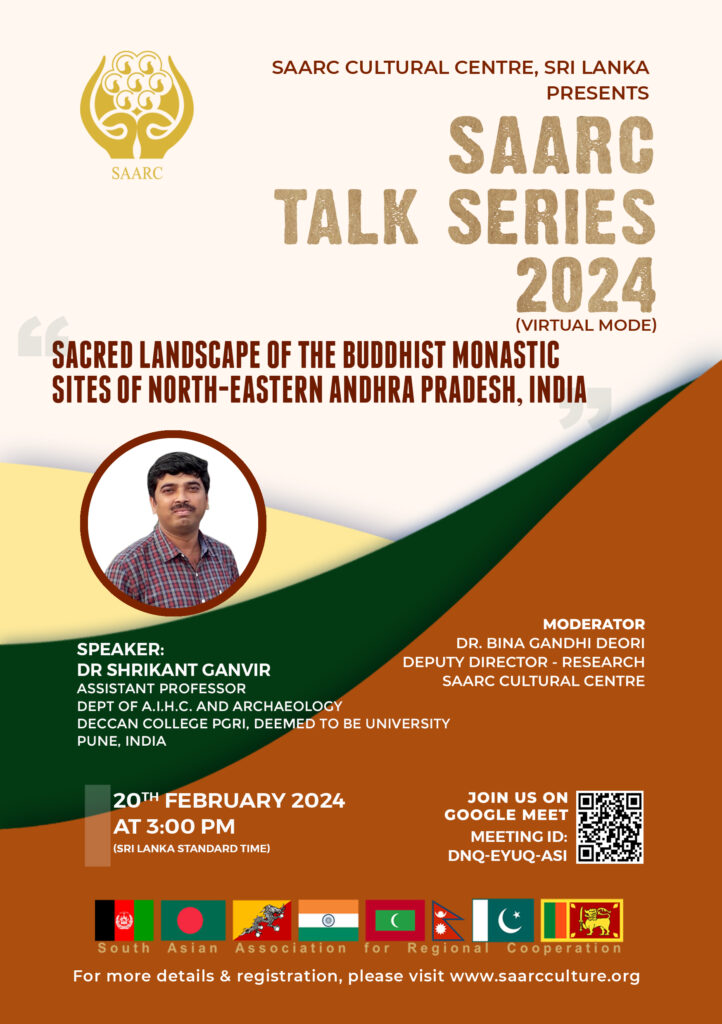
SAARC Cultural Centre, Colombo is presenting its upcoming First Session of the SAARC Talk Series 2024 on 30th January 2024 (Tuesday) at 3:00 pm (Sri Lanka Standard Time). The lecture will be delivered by Prof. Swadhin Sen, Department of Archaeology, Jahangirnagar University, Bangladesh.
Prof. Swadhin Sen will deliver his lecture on the topic “Breaking the Spatiotemporal Boundaries of Continuity and Change: Thinking About Archaeology of Bangladesh”.
The presentation is open to public. To attend kindly register at the link given below.
Please click here to register
Meeting link: https://meet.google.com/utq-jgep-cre
Do spread the word. We look forward to your participation and engaging discussions during this enlightening lecture.
